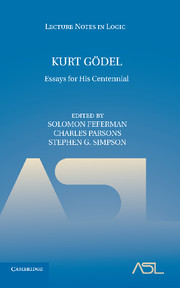Book contents
- Frontmatter
- Contents
- Introduction
- GENERAL
- PROOF THEORY
- SET THEORY
- PHILOSOPHY OF MATHEMATICS
- What did Gödel believe and when did he believe it?
- On Gödel's way in: The influence of Rudolf Carnap
- Gödel and Carnap
- On the philosophical development of Kurt Gödel
- Platonism and mathematical intuition in Kurt Gödel's thought
What did Gödel believe and when did he believe it?
Published online by Cambridge University Press: 04 August 2010
- Frontmatter
- Contents
- Introduction
- GENERAL
- PROOF THEORY
- SET THEORY
- PHILOSOPHY OF MATHEMATICS
- What did Gödel believe and when did he believe it?
- On Gödel's way in: The influence of Rudolf Carnap
- Gödel and Carnap
- On the philosophical development of Kurt Gödel
- Platonism and mathematical intuition in Kurt Gödel's thought
Summary
Gödel has emphasized the important role that his philosophical views had played in his discoveries. Thus, in a letter to Hao Wang of December 7, 1967, explaining why Skolem and others had not obtained the completeness theorem for predicate calculus, Gödel wrote:
This blindness (or prejudice, or whatever you may call it) of logicians is indeed surprising. But I think the explanation is not hard to find. It lies in a widespread lack, at that time, of the required epistemological attitude toward metamathematics and toward non-finitary reasoning.
I may add that my objectivist conception of mathematics and metamathematics in general, and of transfinite reasoning in particular, was fundamental also to my other work in logic.
How indeed could one think of expressing metamathematics in the mathematical systems themselves, if the latter are considered to consist of meaningless symbols which acquire some substitute of meaning only through metamathematics?
Or how could one give a consistency proof for the continuum hypothesis by means of my transfinite model Δ if consistency proofs have to be finitary?
In a similar vein, Gödel has maintained that the “realist” or “Platonist” position regarding sets and the transfinite with which he is identified was part of his belief system from his student days. This can be seen in Gödel's replies to the detailed questionnaire prepared by Burke Grandjean in 1974. Gödel prepared three tentative mutually consistent replies, but sent none of them.
- Type
- Chapter
- Information
- Kurt GödelEssays for his Centennial, pp. 229 - 241Publisher: Cambridge University PressPrint publication year: 2010
- 1
- Cited by

